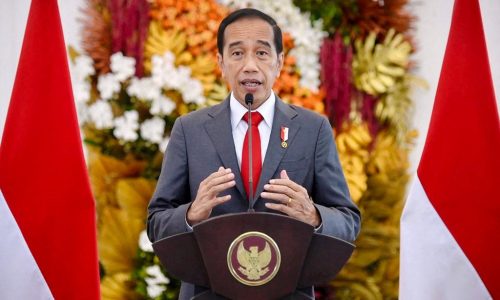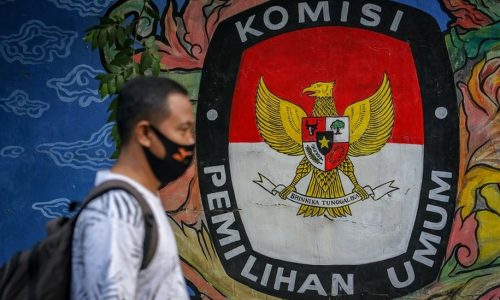National flag carrier PT Garuda Indonesia (IDX: GIAA) has consistently recorded positive performance as reflected in the growth of consolidated operating revenue in the 2023 performance year, which grew by around 40 percent or US$2.94 billion compared to the previous year’s operating revenue of US$2.1 billion. This is one of the indicators of the business performance restructuring steps that continue to run on the track.
The operating revenue was driven by scheduled flight revenue which increased 41 percent y-o-y to US$2.37 billion from US$1.68 billion previously, in line with the movement of people using air transport in the post-pandemic phase which continues to move closer to the pre-pandemic situation. Furthermore, on scheduled passenger flights alone, it grew 52 percent from the previous year to US$2.21 billion.
In line with scheduled flights, non-scheduled flight revenue also recorded growth of up to 65 percent or US$288.03 million from the previous year’s US$174.81 million, of which Haj flight revenue in 2023 contributed a significant increase of 145 percent to US$235.17 million compared to the previous year’s US$92.48 million. Other revenues also rose 15 percent from the 2022 performance to US$270.58 million.
After going through a challenging phase in the pandemic era several years ago by implementing various corrective measures, Garuda Indonesia managed to book a profit for the year of US$251,996,580 which further strengthened the positive fundamentals of Garuda Indonesia’s business performance after completing the restructuring at the end of 2022.
Garuda Indonesia President Director Irfan Setiaputra said the implementation of strategic corporate actions is an effort to accelerate post-restructuring performance recovery coupled with growing passenger movements which is expected to further strengthen the foundation of Garuda Indonesia’s business entities as a group to focus on optimizing operating revenues and efforts to book the company’s profit performance in a sustainable manner.
“Throughout 2023, Garuda Indonesia Group managed to record operational performance through growth in the number of passenger transports by 34 percent, reaching 19,970,024 passengers compared to the previous period of 14,848,195 passengers. In this achievement, Garuda Indonesia managed to carry 8,291,094 passengers and Citilink as many as 11,678,930 passengers,” Irfan said on Monday, April 1, 2024.
Furthermore, in the FY 2023 financial performance book, in line with the completion of the restructuring carried out by the Company at the end of 2022 after the pandemic situation where there was an impairment of assets, Garuda Indonesia also recorded net other income of US$ 344,794,114 which was contributed by one of them from the application of the reversal of impairment of non-financial assets with a value of US$ 198 million. The application of this accounting treatment has certainly been carried out in a prudent and prudent manner by involving the Public Appraisal Services Office (KJPP) and through audit procedures from the public accounting firm appointed by the Company.
In addition to the application of the reversal of impairment of non-financial assets, the bookkeeping also recorded a gain on the withdrawal of bonds worth US$63.88 million which was carried out in December 2023 through a partial repurchase of the 2022 New Bonds where the difference between the carrying value and the amount paid was recorded as a gain on bond repurchase.
Irfan added, “The corporate action of partially repurchasing the bonds is one of the processes to fulfil the restructuring obligations, in which in this case the holders of Notes and Sukuk are mostly Garuda creditors who are following the Debt Payment Obligation (PKPU) stage.”
Garuda Indonesia’s debt restructuring step, which began at the end of 2021, was able to bring the Company back to its feet after receiving approval from creditors as stipulated in the homologation agreement in 2022 for a 50 percent reduction in debt value, from the previous debt value of US$10.9 billion to US$4.79 billion.
Until now, the company continues to fulfil its debt repayment obligations through a number of schemes including (1) making gradual repayments through operational cash flow, (2) converting debt into New Equity, New Notes, Local Debt Receivables and New Sukuk (3) converting long-term debt for bank creditors, State-owned Enterprises (SOEs) and subsidiaries, and (4) partially repaying New Notes and New Sukuk through Tender Offer.
“We certainly hope that the gradual debt repayment efforts in accordance with the agreed Peace Agreement and the Company’s optimized performance acceleration steps will be able to realize Garuda Indonesia’s focus as a healthy business, although it cannot be denied that the ongoing recovery process will take a long time in the midst of various challenges in the future that need to be faced strategically,” Irfan said.
Add 8 aircraft by end of 2024
Furthermore, in 2024 the company will focus on optimizing operating income through a number of corporate actions, including Garuda Indonesia’s target to strengthen its fleet with the addition of 8 aircraft consisting of four narrow body Boeing 737-800NG types and two wide-body Boeing 777-300ER types and two Airbus 330-300 types that will arrive gradually throughout 2024 to maximize passenger occupancy rates and support the expansion of flight networks both domestically and internationally.
With the projected aircraft additions, Garuda Indonesia as the main brand is expected to operate up to 80 aircraft by the end of 2024.
Throughout 2023, Garuda Indonesia also recorded a growth in fleet utilization rate to 07:55 compared to 06:46 in 2022. The consistent growth of operational aspect indicators is also reflected in the number of Garuda Indonesia Group flight frequencies served throughout 2023, which amounted to 145,500, growing by around 38 percent compared to 2022.
Diversification and business portfolio expansion
In addition, performance improvement initiatives are also maximized through the performance of Garuda Indonesia’s subsidiaries. This is reflected in several business prospects that have begun to be explored by the GMF Aero Asia (GMFI) business line − engaged in aircraft maintenance − which in the 2023 performance year also managed to record an operating revenue of US$373.2 million, marking a significant growth of 56.9 percent from the previous year.
GMFI also managed to record a net profit of US$20.2 million throughout 2023. This is supported by the prospect of business diversification carried out by GMFI which is now also expanding its market share in defense aircraft maintenance services and industrial solutions.
Meanwhile, Citilink also continues to strengthen its market share by focusing on developing its flight network in the low-cost market segment and pioneering flights. Through Citilink’s business portfolio development steps, in 2023 the airline, which operates in the low cost carrier segment, managed to record passenger growth of 25.74 percent to 11.68 million passengers.
This achievement is shown through the aircraft seat occupancy rate for YTD December 2023 where Citilink recorded a figure of 78.70 percent, growing by 1.50 percent compared to the previous year’s achievement which recorded a figure of 77.20 percent. These achievements were also reflected in Citilink’s steps to improve its financial performance, which showed a positive outlook.
Optimizing Performance Platform Strengthening
In line with its positive performance, Garuda Indonesia also recorded solid growth in financial and operating performance fundamentals. This is represented by the FY 2023 Earnings before interest, taxes, depreciation, and amortization (EBITDA) position which continues to record improvements compared to FY 2022 performance. In addition, Garuda Indonesia’s current liabilities also recorded a decline of around 30 percent from FY 2022’s US$1,681,029,672 to US$1,165,155,552. This decrease in short-term liabilities is an important indicator in illustrating the solidity of financial performance restructuring, especially related to the value of trade payables in the current performance year.
In addition, the ASK (available seat kilometer) indicator also showed a positive growth of 33.5 percent from 2022. Furthermore, cargo transportation, which previously showed a downward trend until the middle of last year, at the end of the 2023 performance year also showed growth with a positive outlook of 11.3 percent to 48.5 thousand tonnes in quarter 4-2023 when compared to quarter 3-2023 of 44.1 thousand tonnes.
With these indicators, Garuda Indonesia’s business performance acceleration in 2024 will be focused on maximizing revenue potential in the commercial line including cargo and scheduled and non-scheduled flights as well as ancillary revenue, aligning the foundation of corporate performance related to ideal business expense management to optimising risk management management management in measuring the ability to meet the company’s long-term business obligations.
Recovery acceleration
Post-restructuring, Garuda Indonesia continues to improve performance optimization in line with the projected recovery of the aviation industry which is expected to grow gradually.
Irfan said the completion of restructuring at the end of 2022 provided an opportunity for the company to make comprehensive fundamental changes to the entire business foundation of business performance.
“With performance fundamentals that gradually continue to show consistent recovery including through measurable equity improvement steps, we are optimistic that 2024 will be a monumental year in accelerating Garuda Indonesia’s business performance. This is in line with IATA’s projection that the aviation industry will complete its recovery phase gradually by 2024.” Irfan said.
“Departing from the performance achievements that show improvement efforts and the breadth of business development potential that can be maximized in the post-pandemic phase, we are optimistic about pursuing accelerated performance of an adaptive, agile Company that is ready to become a profitable business,” he concluded.









